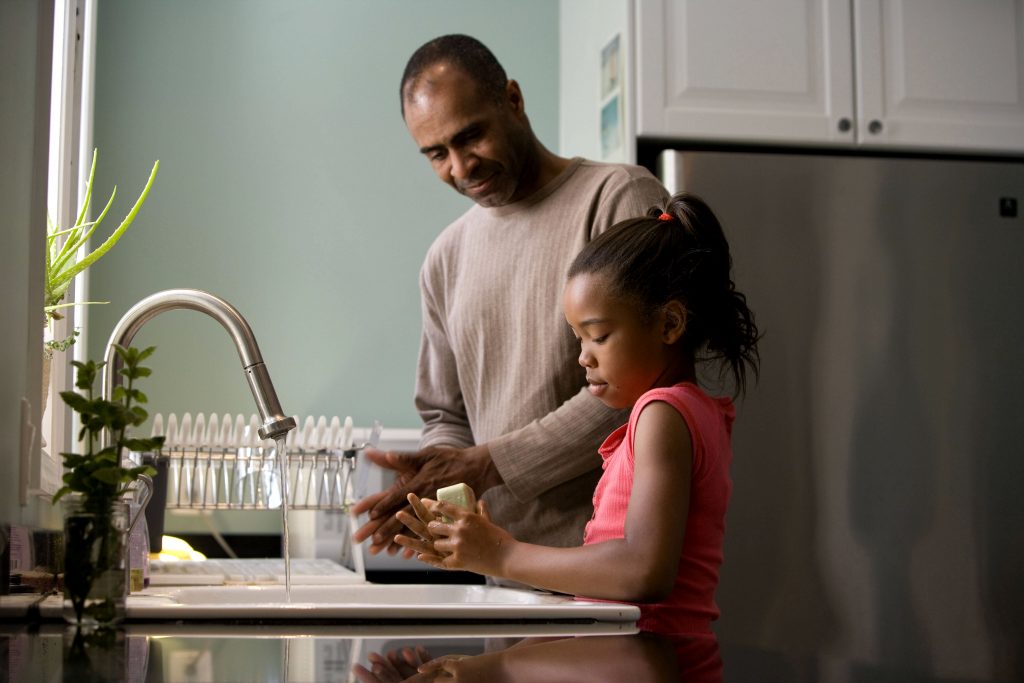
Even when children are very young, chores and clean up time are massively beneficial for child development. New responsibilities teach kids to use recall, common sense, and basic motor skills. They also teach kids to work alongside their family members, which is critical considering how much of life consists of getting along and going along. It’s also supremely important to instill cleanliness as a value. That’s not innate. (You probably noticed that when the kid started eating soup off the floor.) The key is to be aggressive about the whole endeavor.
A toddler or advanced infant isn’t just going to listen or understand when a parent simply says “clean up.” A parent needs to set an example, be a bit demanding, and not shy away from going all Mary Poppins. Singing a bit never hurt anyone.
“Cleaning up is something that stays pretty ‘cooperative based’ for the first two years: expect that it will be very adult-modeled and help support it to be child-followed,” says Kiki Nelson, infant education coordinator at Portland, Oregon preschool Growing Seeds. “If you continue to model it as an important part of the play, it will become part of the expectation later. Framing the message in the positive with consistent follow through relays the message that this is an anticipated part of the day: ‘We always clean up before we go outside.’”
The cleanup directive can start at a very early age, more or less once motor skills permit and have aligned with cognition. At the early stages, when cleaning up is mostly just putting toys back in a box, Nelson recommends parents get a little more granular and focus not on an overall mess, but on individual items, which allows an infant or young toddler to process what she or he is doing and makes each returned item a small victory.
“Focusing on one thing at a time allows the children the chance to focus on the object and the adult to guide the next move: cleaning up,” says Nelson. “Then you can move on to the books. Then the dolls. Then the trucks.”
How to Get a Kid to Enjoy Clean Up Time
- Get involved, because even the most advanced kid likely won’t respond to simply being told to clean up.
- Start as early as possible to make clean up time a habit rather than a chore.
- Help a child focus on one type of specific object or group of objects at a time.
- Add a song that will become part of the ritual and make the kids feel like it’s a game.
- Make the task a game explicitly by adding elements of “eye spy” or treasure hunting.
Making the cleanup process fun is relatively easy, too: It’s not until they’re teenagers that kids suddenly treat chores like a medieval torture session. It all starts with a song. Luckily, pop culture has already provided parents a tremendous entry in the songbook with “The Cleanup Song,” variations of which range from the still-somehow-popular Barney version to myriad takes readily available not the internet.
Pairing a cleanup routine with music serves a dual purpose: It makes everything a bit more fun, but also adds a slight sense of urgency to the proceedings, functioning as something of a timer that runs out when the song is over. It’s also a good time to personalize the words so a child feels like the song is actually about them, incorporating their names into the song so they feel extra special.
“At this age having your name sung is desirable, so it truly encouraged children to help out,” says Growing Seeds toddler/transition coordinator Julianne Lampert. “I would ask ‘how are you helping?’ or ‘show me how you are helping’ and continue singing about (the children) who were, and often within 5 seconds they were helping and I sang their name. I would sing names repeatedly as they helped, keeping the feeling supportive and upbeat.”
Simply being a part of something parents and other kids are doing is also appealing: Kids don’t like to be left out, even when it comes to cleaning. That means giving them a rag and allowing them to wipe up a spill or getting a “kitchen helper” tower to let them rinse dishes. Sure, a parent who allows a child to put their folded laundry in a drawer is doomed to re-fold it, but they’re also bonding with a child and instilling in them the value of cleanliness.
Making a game of any chore is a tried-and-true method for getting a child to actually enjoy helping out, too, and with cleaning up the possibilities are endless. With the power of imagination, a kid can become a construction crane delivering toys to the bin, or a mother bird putting babies in a nest. A game of “I Spy” in which a parent identifies a mystery item for the child to find and put away flexes the cognitive muscles while keeping things fun.
During clean up time, then, it’s important to keep a child’s interests in mind in order to get them to really enjoy the chore. And for an active parent who stays hands-on, cleanup time can turn from a headache to something both they and the child can truly enjoy.
“Like everything else at this age they are learning and forming understandings. I want them to develop a positive idea about cleaning up, so I create positive experiences around it,” says Lampert. “As they grow it will become more of a personal responsibility, but in toddlerhood we are laying the foundation, which means hands-on support and warmth.”

